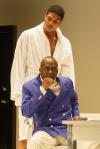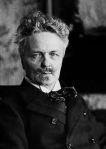Music/CDs
Crossing Over: Go on, Risk it!
Gone are the days when the Met refused to look at a singer if (s)he went on and did a Broadway show or concerts of popular songs —something that happened to Jan Kiepura and his wife, Marta Eggerth, for example. (In her case, it was compounded; she made an MGM movie with Judy Garland!) Today, for the record companies it’s all about crossover—and personally I’m delighted. Good music is good music, whatever its idiom. You cannot attack Irving Berlin for not being
—something that happened to Jan Kiepura and his wife, Marta Eggerth, for example. (In her case, it was compounded; she made an MGM movie with Judy Garland!) Today, for the record companies it’s all about crossover—and personally I’m delighted. Good music is good music, whatever its idiom. You cannot attack Irving Berlin for not being  Beethoven or Brahms. You simply have to accept or recognize that within his genre and approach he was among the very best—and that his music lives on. Also, singers who perform this music (though they’re not trained for it or associated with it), have simply learned to adapt their technique for the best results.
Beethoven or Brahms. You simply have to accept or recognize that within his genre and approach he was among the very best—and that his music lives on. Also, singers who perform this music (though they’re not trained for it or associated with it), have simply learned to adapt their technique for the best results.
So I welcome and recommend recent discs by Diana Damrau and Natalie Dessay, and an earlier tribute to Mario Lanza (and hence, in its way, Caruso) by the Maltese tenor, Joseph Calleja. Not to mention the songs of Richard Tauber being resurrected by Piotr Beczała in an exceptionally lovely album.
 The skill, charm and sheer joy that Beverly Sills brought to her TV shows with Carol Burnett and Julie Andrews made the point that she understood the craft of the popular idiom and was as artistically committed to it as her partners.
The skill, charm and sheer joy that Beverly Sills brought to her TV shows with Carol Burnett and Julie Andrews made the point that she understood the craft of the popular idiom and was as artistically committed to it as her partners.
Indeed, Andrews was known to prepare songs for shows—or her fine recording of The King and I—with at least as much zeal as the great lieder singers, repeatedly checking and trying out every variation for colouring each word and musical phrase until she got them the way they ought to be (in her opinion).
But there’s another avatar of crossover who remains in my heart: the brilliant singing actress Teresa Stratas. When I was a child in Toronto, my piano lessons at the Royal Conservatory of Music ran from 4 PM-5 PM. Every week, while my mother waited for me in a Conservatory hallway, a teen-aged girl named Teresa would turn up for a singing  lesson that started at 4.30. My mother said Teresa was miserable because her family were forcing her to study opera, claiming they could see she had a real gift for it. But what she really wanted to do was make a career of singing pop stuff, as she did with her sister several times a week to entertain the diners in the family’s restaurant.
lesson that started at 4.30. My mother said Teresa was miserable because her family were forcing her to study opera, claiming they could see she had a real gift for it. But what she really wanted to do was make a career of singing pop stuff, as she did with her sister several times a week to entertain the diners in the family’s restaurant.
A few years later my mother took me to hear to hear Teresa sing her first Madama Butterfly for the then-fledgling Canadian Opera Company. We went backstage to say hello, where my mother relished saying: “See, I told you your parents were right and that you should stick to the opera lessons!” “But,” said Teresa, “I still love singing pop, Broadway and  jazz, and now they won’t even let me do that.” Later in her career, when she could demand her own way and get it, she returned to her teenage passions, to prove that opera and pop were not mutually exclusive.
jazz, and now they won’t even let me do that.” Later in her career, when she could demand her own way and get it, she returned to her teenage passions, to prove that opera and pop were not mutually exclusive.
When I started the magazine Opera Now, I met Teresa briefly again at the launch party for the recording of Show Boat on which she brilliantly plays Julie, bringing all her acting and vocal skills to the part and proving that, if she had not stuck with her opera lessons (as our mothers recommended), she might have had a hell of a career on Broadway. Mind you, being a definitive Salome or Lulu is not bad going, either.
Natalie Dessay, like Beverly Sills, has a naturally light voice used with such intelligence that she can sing everything—Zerbinetta or Marie in La Fille du Régiment—with as much conviction as Violetta in La Traviata and other, heavier roles (not excluding Marie in Berg’s Wozzeck or, just this last season at the Met, Cleopatra in Handel’s Giulio Cesare).  Working with Michel Legrand, who studied with Nadia Boulanger before he was “sidetracked” into film scores and songs, Dessay has created what promises to be the first of a new series of recitals. In this first one—Entre Elle et Lui (see below)—she sings exquisitely a range of Legrand songs, many of which are now standards. Her programming is smart and varied. Legrand said of her that she “sings my music with so much joy, yet so much anguish, such lightness of touch, such despair, such laughter and tears.” All I can do is quote Harold Arlen: “Ain’t it the Truth!”
Working with Michel Legrand, who studied with Nadia Boulanger before he was “sidetracked” into film scores and songs, Dessay has created what promises to be the first of a new series of recitals. In this first one—Entre Elle et Lui (see below)—she sings exquisitely a range of Legrand songs, many of which are now standards. Her programming is smart and varied. Legrand said of her that she “sings my music with so much joy, yet so much anguish, such lightness of touch, such despair, such laughter and tears.” All I can do is quote Harold Arlen: “Ain’t it the Truth!”
As with all the best crossover performers, like Stratas or Risë Stevens when they switched gears, Dessay understands the art of developing a simpler, non-operatic style, and matches Legrand’s superb pianism note for note. Also, it has to be said, the microphone is in love with Dessay’s voice. Working mainly in their native French, the two create a wonderful smoky atmosphere (think cabaret club), but you will also love “Papa Can You Hear Me?” from the movie Yentl; “Les moulins de mon Coeur” (“Windmills of my Mind”) from The Thomas Crown Affair; and the duets—first with Patricia Petibon (“Chanson des Jumelles”) and then with Laurent Naori (“Duet de Guy et Geneviève”), both from the film Les Demoiselles de Rochefort. It’s an impact equal to Barbara Streisand’s first Broadway albums. Dessay also brings to mind both Stratas in her prime and Maria Ewing’s jazz evenings at Ronnie Scott’s in London, where that singer discovered and deployed a whole new vocal technique and range to interpret the music.
Diana Damrau is more Sills than Streisand in her new album Forever, in which she sings songs from operettas, musicals and movies. The twenty-one songs are such interesting choices that I kept wondering just who dominated the  selection process—Damrau or her producer? And I found it riveting to hear some of the Broadway songs (popular in Germany) sung in translation. Certainly there is not one track that doesn’t fit her voice, and she totally inhabits each one: Kalman, Lehár, Lerner and Loewe, Sondheim, Gershwin (“Summertime” is stunning) and even the Sherman Brothers (“Feed the Birds” from Mary Poppins). Ably abetted by David Charles Abell and the Royal Liverpool Philharmonic Orchestra, Forever is a treat that also reminds you how good the music actually is and makes you want to go back to the complete show or operetta. It also makes me want to hear Damrau in Bernstein’s Candide and many other things.
selection process—Damrau or her producer? And I found it riveting to hear some of the Broadway songs (popular in Germany) sung in translation. Certainly there is not one track that doesn’t fit her voice, and she totally inhabits each one: Kalman, Lehár, Lerner and Loewe, Sondheim, Gershwin (“Summertime” is stunning) and even the Sherman Brothers (“Feed the Birds” from Mary Poppins). Ably abetted by David Charles Abell and the Royal Liverpool Philharmonic Orchestra, Forever is a treat that also reminds you how good the music actually is and makes you want to go back to the complete show or operetta. It also makes me want to hear Damrau in Bernstein’s Candide and many other things.
The boys are getting in on the crossover act, too.  Long ago, Howard Keel (once George London’s classmate) told me that he studied with Lotte Lehmann; she was instrumental in pushing him in the direction of Oscar Hammerstein II and an audition for replacing the legendary Alfred Drake as Curly in Oklahoma! Keel feared that, if he got the job, the Met would never look at him again. Before he would meet with Hammerstein, Lehmann had to promise she would intercede when he wanted to return to the classical world—which, of course, he didn’t, having found himself totally at home in musicals from the first rehearsal. But Lanza (who, according to Toscanini, had as great a natural talent and sound as the great Caruso himself), was unable to make the shift back to classical opera when he wanted to for many reasons. Surely one of them was the perception of managements of that era of his Hollywood career: he was a turncoat, a sell-out and a lightweight.
Long ago, Howard Keel (once George London’s classmate) told me that he studied with Lotte Lehmann; she was instrumental in pushing him in the direction of Oscar Hammerstein II and an audition for replacing the legendary Alfred Drake as Curly in Oklahoma! Keel feared that, if he got the job, the Met would never look at him again. Before he would meet with Hammerstein, Lehmann had to promise she would intercede when he wanted to return to the classical world—which, of course, he didn’t, having found himself totally at home in musicals from the first rehearsal. But Lanza (who, according to Toscanini, had as great a natural talent and sound as the great Caruso himself), was unable to make the shift back to classical opera when he wanted to for many reasons. Surely one of them was the perception of managements of that era of his Hollywood career: he was a turncoat, a sell-out and a lightweight.
 The point is that the two worlds were kept separate in those days and that the opera house despised performers who popularized opera or who sang it (and popular music) outside the opera house itself. Fortunately and sensibly this is no longer the case. Nowadays we can enjoy Joseph Calleja on a recital disc like Amore or, better yet, Be My Love (his tribute to Lanza), and see him at the Met at the same time. Piotr Beczała has also just crossed over with Heart’s Delight, reviving the songs of Richard Tauber from the worlds of operetta, film and popular song. Both men are superb singers with serious careers and both are unashamed advocates of this music which, while it may be perceived as lighter than operatic repertoire, is certainly no less technically, dramatically or vocally demanding. It requires its own sensitivities
The point is that the two worlds were kept separate in those days and that the opera house despised performers who popularized opera or who sang it (and popular music) outside the opera house itself. Fortunately and sensibly this is no longer the case. Nowadays we can enjoy Joseph Calleja on a recital disc like Amore or, better yet, Be My Love (his tribute to Lanza), and see him at the Met at the same time. Piotr Beczała has also just crossed over with Heart’s Delight, reviving the songs of Richard Tauber from the worlds of operetta, film and popular song. Both men are superb singers with serious careers and both are unashamed advocates of this music which, while it may be perceived as lighter than operatic repertoire, is certainly no less technically, dramatically or vocally demanding. It requires its own sensitivities  and interpretative powers and a wide-ranging intelligence from people who more often sing Verdi, Donizetti or even Wagner. The sheer loveliness of Beczała’s voice in particular shines in his crossover album.
and interpretative powers and a wide-ranging intelligence from people who more often sing Verdi, Donizetti or even Wagner. The sheer loveliness of Beczała’s voice in particular shines in his crossover album.
These recordings illustrate two things: firstly, that creating popular music is no less important than creating the recognized “classics” (and we do well to remember that most classics started out as popular music in their day); and that if artists at the level of Dessay, Damrau, Calleja and Beczała are interested in the job we should respect their commitment to a wider range of expression than previous artists were permitted. And also, frankly, just wallow with pleasure in some of the lush tunes!
Every one of these discs is worth having in your collection; be thankful they are performed with such skill and enjoyment. If you don’t like musicals or operettas, forget it; just don’t sneer at the artists or audiences who do, or underrate the artistry needed to excel at these idioms. Opera, musicals and jazz are not mutually exclusive. They are all simply at different locations, or represent different shades, on a spectrum, as these four artists demonstrate.
And don’t forget that recording of Jerome Kern and Oscar Hammerstein II’s Show Boat. Conducted by John McGlinn, it featured not only Teresa Stratas but Frederica von Stade, Jerry Hadley and Bruce Hubbard—all opera singers inviting you to cross over with them. Just say yes!
Erato 5099993414821 Natalie Dessay, Michel Legrand: Entre elle et lui
Erato 5099960266620 Diana Damrau, Forever: Unforgettable Songs from Vienna, Broadway and Hollywood. The Royal Liverpool Philharmonic Orchestra conducted by David Charles Abell
Decca 478 3531 Joseph Calleja, Be My Love: A Tribute to Mario Lanza. BBC Concert Orchestra conducted by Steven Mercurio
Decca 478 5340 Joseph Calleja, Amore. BBC Concert Orchestra conducted by Steven Mercurio
DG 479 0838 Piotr Beczała, Heart’s Delight: The Songs of Richard Tauber. Royal Philharmonic Orchestra conducted by Lukasz Borowicz









